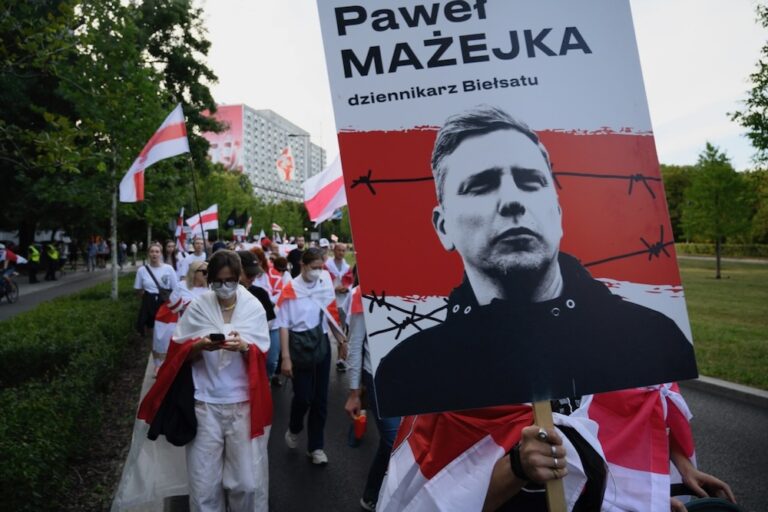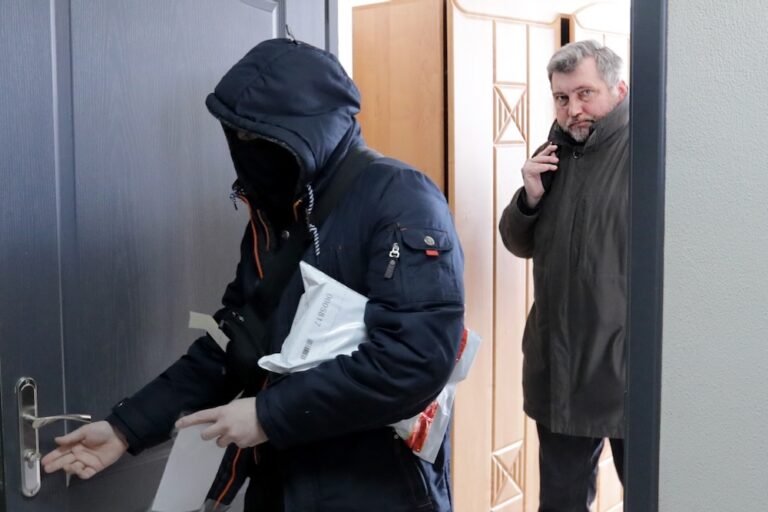(ARTICLE 19/IFEX) – The government of Belarus has proposed new legislation to gag criticism of the President. Among its provisions are an amendment to the Criminal Code making public insult or slander of the President punishable by up to four years’ imprisonment or two years’ hard labour. Even stiffer sentences may be imposed for the […]
(ARTICLE 19/IFEX) – The government of Belarus has proposed new legislation
to gag criticism of the President. Among its provisions are an amendment to
the Criminal Code making public insult or slander of the President
punishable by up to four years’ imprisonment or two years’ hard labour. Even
stiffer sentences may be imposed for the same actions committed “repeatedly
or with the use of the press or other means of mass communication”.
**For further background to legislation, see IFEX alerts and press releases
of 10 June, 5 June, 27 May 1998, and others**
By another provision, the notorious Article 5 of the Law on Press would be
amended to prohibit use of the media to publish information “damaging the
honour and dignity of the President”. Such an amendment was originally
proposed in 1997, but following a domestic and international outcry by media
and human rights bodies, it was modified when a number of amendments to the
Press Law were passed by the National Assembly in December. The government
is now proposing to reintroduce this very measure which raised such
protests.
A third provision would amend the Administrative Code to prohibit “the use
in public places of placards, banners and other items the content of which
degrades the honour and dignity of the President”. Breach of this provision
would incur a substantial fine or from three to fifteen days’ detention.
The proposals would also introduce a new provision into the Law on the
President making make “hindrance of the legal activity of the President”
punishable by law.
The proposals were passed by the National Assembly at first reading on 4
June by a vote of 64 to two. Local observers fear that the legislative
process will be completed and these measures signed into law by the
President very soon, probably before the end of June.
The proposed amendment to the Law on Press augments a number of restrictive
amendments to that law which came into force in January. It is all the more
outrageous in view of the statement made by the Belarusian government
delegation to the UN Commission on Human Rights in April this year that:
“Certain amendments to the Law on Press are being considered now in Belarus
in order to bring it into conformity with [international] standards.” The
proposed amendment is a clear and deliberate move in precisely the opposite
direction.
This proposed battery of legislative changes is the fifth major
retrogressive step taken by the Belarus government since the beginning of
1998 to tighten the ratchet of official control over the media and freedom
of expression, in blatant disregard of Belarus’s obligations under
international law.
RELEVANT INTERNATIONAL HUMAN RIGHTS STANDARDS
Belarus is obliged under international law, as a state party to the
International Covenant on Civil and Political Rights, to comply with the
provisions of that treaty, Article 19 of which states: “Everyone shall have
the right to freedom of expression; this right shall include freedom to
seek, receive and impart information and ideas of all kinds, regardless of
frontiers, ¼through any media ¼ of his choice”
While international human rights law does permit some restrictions on
freedom of expression in certain limited and closely defined circumstances,
it is well established that the right to freedom of expression includes in
particular the freedom to criticise the government and to express political
views. The European Court of Human Rights has ruled on this in a number of
cases, stating that there must be more leeway to criticise government or
public officials than may be allowed in criticism of private individuals. In
a 1986 landmark judgement the Court stated:
Freedom of the press … affords the public one of the best means of
discovering and forming an opinion of the ideas and attitudes of political
leaders. More generally, freedom of political debate is at the very core of
the concept of a democratic society … The limits of acceptable criticism
are accordingly wider as regards a politician as such than as regards a
private individual.
The Court has ruled that while individuals are entitled to protection of
their reputation, for politicians the requirements of such protection must
be weighed in relation to the interests of open discussion of political
issues. The Court has also noted the dangers of applying sanctions against
those who criticise political figures, because such sanctions are “liable to
hamper the press in performing its task as a purveyor of information and
public watchdog”.
RECOMMENDATIONS
provide additional special protection for the reputation of the President
should
be dropped immediately as being in flagrant breach of Belarus’s
international
human rights obligations.
to Article 5 of the Law on Press, providing special protection against
insult or
criticism to government institutions, their members, officials, or the
President
should be repealed. Such individuals should have, at the maximum, no
greater
degree of protection against defamation than private individuals.
international human rights bodies on the importance for a democratic
society
of allowing free political debate and, accordingly, that public figures
must
expect to tolerate a greater degree of criticism than private individuals.
Recommended Action
Send appeals to authorities:
members of the government as indicated below
Appeals To
President Alexander Lukashenka
pl. Nezavisimosti, 220010 g. Minsk
fax: +375 17 223 58 25 / 226 06 10
fax: +375 17 222 38 72 / 222 32 84Mr Mikhail Myasnikovich
Chief of the Presidential Administration
pl. Nezavisimosti, 220010 g. Minsk
fax: +375 17 223 58 25 / 226 06 10
fax: +375 17 222 38 72 / 222 32 84Mr Anatoly Malafayev
Speaker, House of Representatives
Natsionalnoye Sobranie, 220 010 Minsk
fax: +375 17 227 37 84 / 227 79 85
fax: +375 17 227 13 18 / 222 67 60Mr Pavel Shipuk
Speaker, Council of the Republic
ul. Krasnoarmeiskaya 4, 220016 Minsk
fax: +375 17 227 79 85 / 227 37 84
fax: +375 17 227 13 18 / 222 67 60Please also send a copy of such letters to the Belarus ambassador or other
Belarusian diplomatic representation in your countryPlease draw this proposed legislation to the attention of the following
bodies
in your country:-Foreign Ministry (department responsible for relations with Belarus);
-government unit responsible for international human rights policy (in most
countries, such a unit is based in the Foreign Ministry);
-foreign policy committee(s) of the parliament/legislature;
-other members of Parliament (and/or, in the case of EU member states,
MEPs) who may have an interest in these issues;
-trade unions of media professionals;
-foreign desks of the principal news media.


